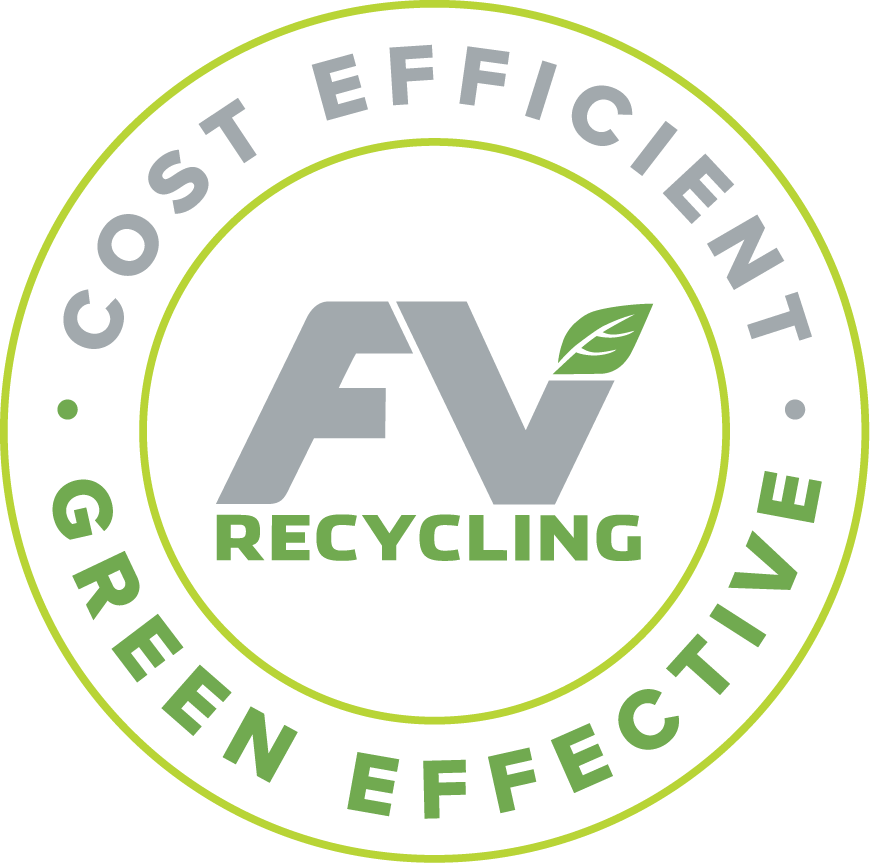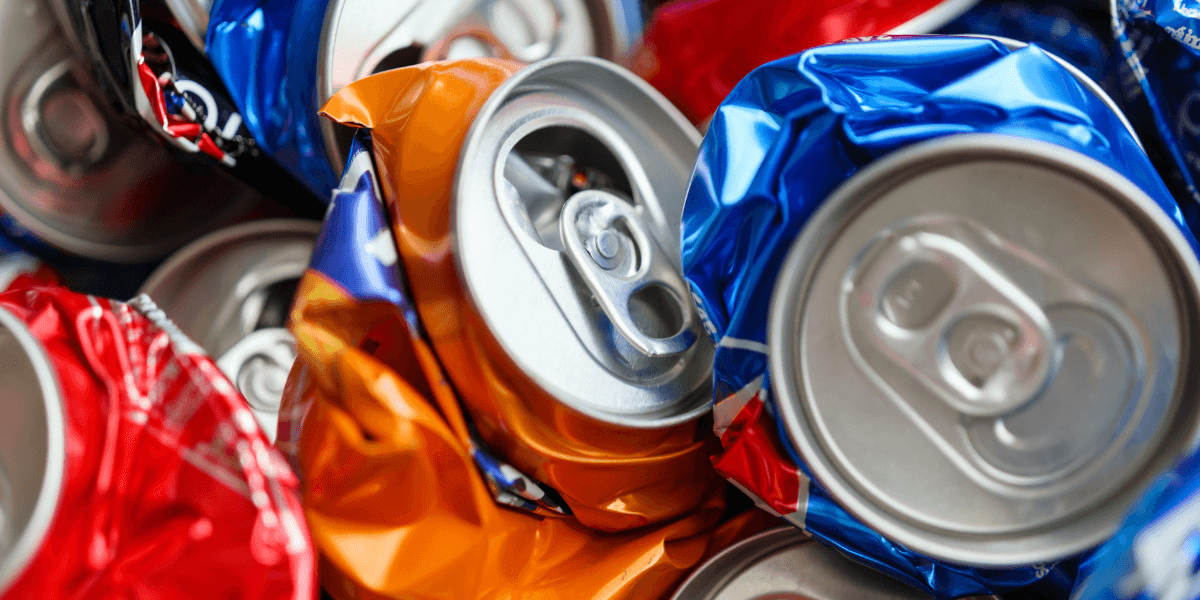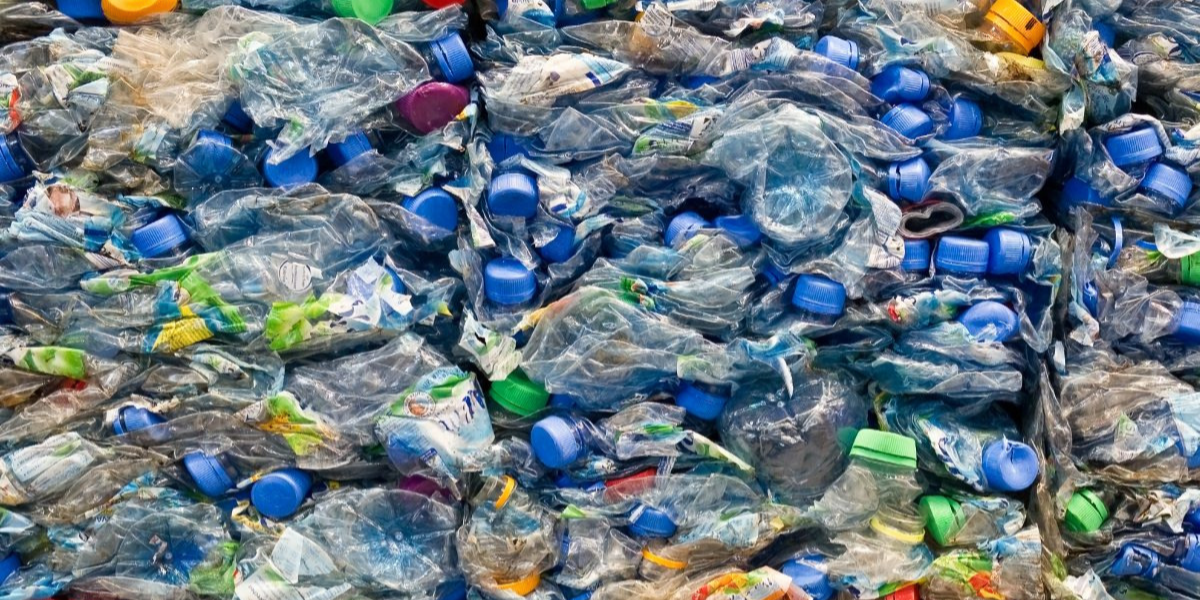Reducing Commercial Waste
Commercial waste is generated when businesses have a surplus of materials used in their everyday operations such as paper, cardboard, aluminum, and...
![]()
Sign up for monthly notifications from FV Recycling to stay up-to-date on news, events, education and more.
![]()
5 min read
 FV Recycling
:
Jan 28, 2025 2:45:44 PM
FV Recycling
:
Jan 28, 2025 2:45:44 PM
Table of Contents
Recycling aluminum is one of the simplest yet most impactful ways to contribute to a sustainable future. Aluminum is unique in its ability to be recycled repeatedly without losing quality, making it an invaluable resource in the global push toward reducing waste and conserving energy.
In this blog, we’ll explore the basics of aluminum recycling, what you need to know to get started, and answer some common questions about recyclability.
Aluminum is one of the most recyclable materials on the planet, thanks to its unique properties and efficient recycling process. The journey begins when consumers place aluminum items—such as beverage cans—into recycling bins. Here’s a more detailed look at what happens next:
Collection: Aluminum waste is collected through curbside recycling programs, drop-off centers, or commercial waste management services. This ensures that the material enters the recycling stream instead of ending up in landfills.
Sorting: At recycling facilities, aluminum items are separated from other materials. Advanced sorting technologies, such as eddy current separators, are used to identify and extract aluminum efficiently.
Cleaning: Once sorted, the aluminum is cleaned to remove contaminants like food residue, labels, or adhesives. This step is crucial to ensure the quality of the recycled material.
Shredding and Melting: The cleaned aluminum is then shredded into small pieces, which are melted in high-temperature furnaces. This molten aluminum is poured into molds to create ingots or slabs.
Reformation: These ingots are transported to manufacturers and used to produce new aluminum products, such as cans, car parts, or construction materials.
Recycling aluminum is incredibly energy-efficient. It requires only 5% of the energy needed to produce aluminum from raw bauxite ore, significantly reducing greenhouse gas emissions. Additionally, the process conserves natural resources by reducing the demand for mining and refining bauxite.
Another remarkable aspect of aluminum recycling is that the material does not degrade in quality, no matter how many times it is recycled. This durability ensures that recycled aluminum is just as strong and versatile as newly produced aluminum, making it an ideal material for a wide range of applications. By participating in aluminum recycling, you contribute to a closed-loop system where resources are reused continuously, reducing waste and environmental impact.
Many people wonder, “Where can I recycle aluminum cans near me?” The good news is that most curbside recycling programs accept aluminum cans, making it convenient for households to participate in aluminum recycling. However, proper preparation is key to ensuring the cans can be efficiently processed.
Here are a few tips for recycling aluminum cans effectively:
Rinse Your Cans: Even a small amount of residue can contaminate an entire batch of recyclables, so rinse out any remaining liquid to avoid contamination.
Avoid Crushing (Unless Requested): Some recycling centers prefer uncrushed cans for sorting purposes. Always check your local recycling guidelines to see if crushing is recommended.
Group Similar Materials: While many curbside programs accept mixed recyclables, separating your aluminum items can streamline the process at sorting facilities.
If your area doesn’t have curbside recycling, check for drop-off centers or community programs. Local grocery stores or recycling depots may also offer collection points for aluminum cans. Many programs also accept other materials like plastic, cardboard, and paper, making it easy to recycle multiple items at once.
Businesses play a crucial role in advancing aluminum recycling efforts. Whether operating on a small or large scale, companies can adopt practices that contribute to sustainability and reduce their environmental impact. Here are some ways businesses can get involved:
Implement Recycling Programs: Offices, restaurants, and manufacturing facilities can set up dedicated aluminum recycling bins to encourage employees and customers to recycle. Clear signage and accessible bins make it easier to participate.
Partner with Recycling Services: Collaborating with local recycling companies ensures that aluminum waste is properly collected and processed. Many recycling services offer tailored solutions for businesses, such as bulk collection and scheduled pickups.
Reduce Aluminum Waste: Companies can evaluate their operations to minimize aluminum waste, whether by optimizing packaging designs, reusing materials, or sourcing recycled aluminum for their products.
Expand Recycling Efforts: In addition to aluminum, businesses can implement programs for recycling other materials like plastic, cardboard, and paper. A comprehensive approach to recycling can significantly reduce overall waste.
Promote Awareness: Businesses have a platform to educate employees, customers, and stakeholders about the importance of aluminum recycling. Hosting workshops, sharing educational content, or supporting community recycling initiatives can make a significant impact.
Participate in Industry Programs: Many industries have established recycling initiatives, such as closed-loop systems for packaging. Joining these programs not only enhances sustainability but also strengthens a company’s reputation as an environmentally responsible organization.
By taking these steps, businesses can lead by example, inspire others to prioritize recycling, and contribute to a circular economy where aluminum remains a valuable and sustainable resource.
While aluminum cans are widely recycled, many people are unsure about the recyclability of other aluminum products, such as aluminum foil or trays. The good news is that these items can often be recycled, but there are some important considerations to keep in mind.
Aluminum Foil: Foil is recyclable as long as it is clean and free of food residue. Before recycling, gather smaller pieces into a ball—this makes it easier for recycling facilities to handle. If the foil has been heavily soiled (e.g., covered in grease or sauce), it’s best to dispose of it in the trash to avoid contamination.
Other Metals: Beyond aluminum, many metals—such as steel, copper, and brass—are recyclable. Steel cans (like those used for soup or vegetables) and metal lids are commonly accepted at recycling centers. Larger items, such as appliances or scrap metal, often require drop-off at specialized facilities.
To avoid confusion, always check with your local recycling center to confirm which metal items they accept and whether any special preparation is required.
Recycled aluminum holds significant value, both environmentally and economically. For instance, recycling a single aluminum can saves enough energy to power a television for up to three hours. Multiply that by the billions of aluminum cans recycled annually, and the energy savings are staggering.
From an economic standpoint, aluminum recycling supports industries worldwide. The recycled aluminum market generates billions of dollars in revenue, creating jobs and driving innovation in manufacturing. Additionally, the rapid turnaround of recycled aluminum—which can go from a used can to a new product in as little as 60 days—keeps the supply chain efficient and sustainable.
The value of recycled aluminum also extends to reducing landfill waste. Aluminum cans and other metal products can take hundreds of years to decompose in a landfill. Recycling them not only conserves space but also prevents harmful environmental impacts associated with mining and waste disposal.
One of aluminum’s most remarkable qualities is its ability to be recycled indefinitely without losing strength or integrity. This closed-loop process ensures that aluminum remains a sustainable resource for generations to come. In fact, nearly 75% of all aluminum ever produced is still in use today, thanks to recycling.
This infinite recyclability makes aluminum a key material in the transition to a circular economy. By recycling aluminum, you’re helping to reduce waste, conserve resources, and support a sustainable future. Every can, foil sheet, or aluminum product you recycle contributes to this cycle, creating a lasting impact on the planet.
Encouraging others to recycle aluminum and spreading awareness of its recyclability is a powerful way to contribute to a healthier planet. Next time you finish a soda or use aluminum foil, think about the impact of recycling it and take action—every piece of aluminum counts.
FV Recycling stands out as a trusted partner for all your aluminum recycling solutions. With physical plants located across the Southeast United States, we accept a wide range of recyclable materials, including aluminum. Numerous companies rely on FV Recycling for efficient and cost-effective services tailored to their specific needs.
Comprehensive Services: FV Recycling specializes in handling aluminum bales, which we collect, recycle, or broker for our clients. From small to large bales, we offer convenient pickup services and ensure proper processing at our facilities.
Diverse Material Handling: In addition to aluminum, we manage commercial recycling for cardboard, paper, and plastics, offering customizable solutions for businesses with diverse recycling needs.
Specialized Aluminum Recycling: Our services include collecting aluminum labeled UBC (used beverage cans) and processing it at our state-of-the-art plants. While we focus on beverage cans, we ensure efficient recycling of other aluminum products within our expertise.
Eco-Friendly Practices: FV Recycling prioritizes sustainability by implementing environmentally responsible recycling methods that reduce waste and conserve resources.
Choosing FV Recycling means partnering with a reliable company dedicated to supporting businesses in their recycling efforts. Learn more about our commercial recycling services and how we can help you meet your sustainability goals.

Commercial waste is generated when businesses have a surplus of materials used in their everyday operations such as paper, cardboard, aluminum, and...
.png)
As environmental challenges intensify, the need for effective waste management strategies has become more urgent than ever. Landfill diversion stands...

It’s no secret that businesses produce a lot of waste. The EPA estimates that 75% of the American waste stream is recyclable, but we only recycle...